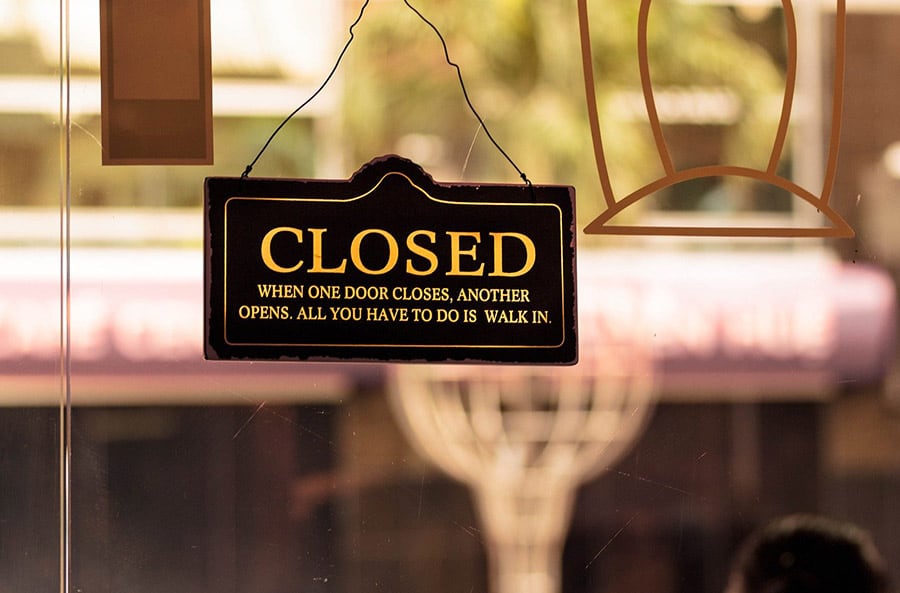DEEP DIVE: How mobility retailers across the UK are adapting to life under lockdown
As the coronavirus made its way across the UK and stringent lockdown measures were introduced to curb the spread in March, many retailers wrestled with the decision to temporarily close. For the mobility retail sector, however, the choice was made all the more difficult as customers rely heavily on the products and services provided to live safe, comfortable and independent lives – something which is critical to those self-isolating.
For many retailers, it has meant weighing up numerous factors including protecting staff and customers safety, keeping stores operational in the face of low demand and footfall, continuing to pay staff on the payroll rather than furloughing, as well as potentially letting vulnerable customers down during a time when they need the industry the most.
Caught in between a rock and a hard place, THIIS has heard from a number of retailers to discover how they have adapted and the tough decisions they have had to make in the wake of the coronavirus crisis.
A tough outlook on the coast
For coastal towns, the impact of the lockdown has been devastating to a local economy that depends so much on tourism and in the mobility sector, this has especially the case.
Karen Sheppard, Managing Director of People First Mobility, outlined how she first adapted to accommodate the emerging epidemic over February and March.
“Our first step was to have gloves and sanitiser at the door for people to. Everything was cleaned more than usual and normally we don’t accept card payments under £10 but we moved more to contactless payments for people and would wipe down the card machine before and after use,” she said.
“Any hires were deep cleaned when they came back in. Things we do anyway became important with added essential cleaning.”
As the pandemic grew and measures to curb the outbreak became more stringent, the coastal mobility boss says the situation led to a rapid and dramatic fall in footfall as people were advised to self-isolate for 12 weeks.
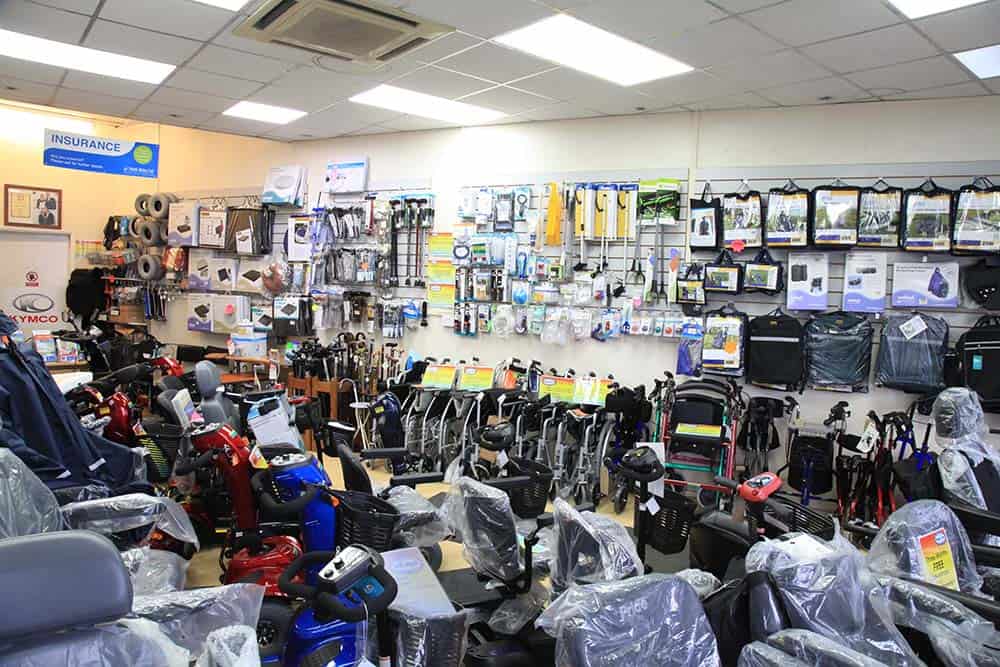
Responding, the company started delivering and leaving items at the door for customers and doing repairs following strict safety precautions, along with preventing people to enter all the way into the shop but rather just in the doorway to be served, along with introducing two-metre distancing rules.
“Things got worse in the country and we had several customers call us to say they needed to cancel a hire they had booked; customers were calling and cancelling repairs or services saying they would not be going out for quite a few weeks and so may as well wait. Discounts were offered with no success,” recollected Karen.
“Being in a small town, there was also added pressure of the local people being unhappy that places were still open, so we took the decision to close the retail premises before the government announced the lockdown. We planned on still taking the calls and doing the repair side via delivery and collection.”
It was the full lockdown of pubs and leisure facilities that had a significant blow to the company’s trade, she highlighted.
“The government announced a lockdown on the pubs and leisure places, which, in turn, had a knock-on effect on a lot of our customers as they could not go to their caravans due to sites closing,” explained Karen.
“Reading through the list of what businesses were allowed to stay open, mobility was not mentioned, despite chemists and pharmacists being listed. With pressure from the local people and with the safety of my employees and customers to consider, I took the decision to close and to not trade.
“I have emailed the local MP and tried to get clarification about mobility stores but as of yet have had nothing back. I understand one company has had backing from an MP and that BHTA says that mobility outlets can still trade. Without the government clarifying that mobility retail is classed as one of those who can open, the fallout from the local people of opening would cause far greater damage than anything we could hope to gain.”
With so many unknowns, Karen stressed that the lack of clarity of surrounding issues such as performing repairs on items such as mobility equipment for those being shielded also made it difficult to know where People First Mobility stood.
“With the majority of customers either self-isolating or unable to travel to their second home, there have been no requests for products or services. Even having a large offering of products is not making any difference in a rural community. Perhaps the NHS are supplying more equipment free to customers at these unprecedented times?” she asked.
“For now, we have to ride things out and see what happens in the next few weeks. In the meantime, I am catching up on a few things I do not normally get chance to do as work long hours, and am also doing some more self-development plus having ideas of things to put into place as soon as things start to get back to normal again.”
A difficult decision for Easy Living
With stores springing up across the Midlands and a new franchise model gaining popularity, Easy Living Mobility had enjoyed a strong 2019 and was all set to continue its rapid growth in 2020 until coronavirus arrived.
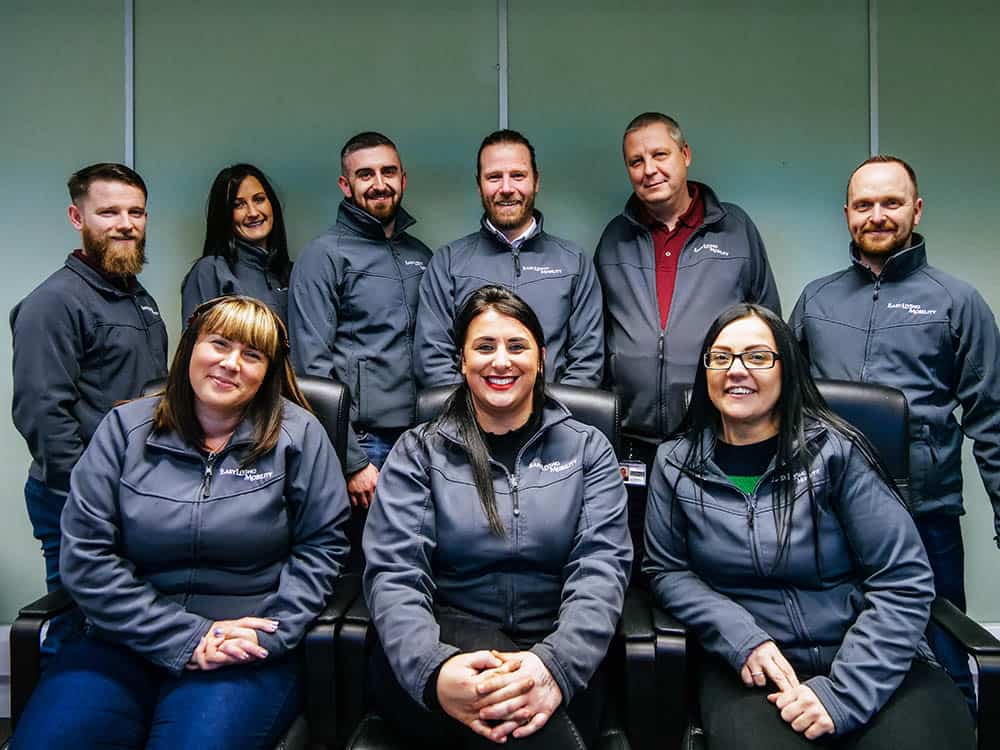
Speaking with Daniel Griffiths, Managing Director of Easy Living Mobility, he detailed the actions he took as the virus spread quickly across the country.
“Very early on, I made the decision to close our 12 retail stores to the public. Obviously, the decision was not taken lightly,” he stated.
“Even though we could have remained open, I took the government advice seriously and felt it necessary to help the government and totally understood we had other ways in how to look after our customer base. The last thing I said to all of our staff was that we cannot, under any circumstances, be seen to be mobilising in an unreasonable and unsafe way and that we were not too make any sales that would be reflected this way.”
Operating with a skeleton staff of just under 10 per cent of the company’s workforce, Daniel took the decision to furlough all of his remaining and stressed to them the importance of staying home and staying safe.
“Demand for product and services have fallen dramatically but so it should have as everyone has been told to stay at home, especially our “A” typical customers of the over 70s and those with underlying health conditions,” he continued.
“Early on in the lockdown, we found a little surge with a good percentage of our continence care customers making larger than usual orders. We managed that well by communicating that we have very good stocks to see us through and advised that there was not a need to spend any more than usual by panic buying or worrying that distribution would be affected as we started our non-contact deliveries. “
Praising the small team that remained on the frontlines to offer help in any way they could, Daniel added that company has continued to service, repair and also install stairlifts throughout the pandemic, emphasising the need for the equipment throughout the pandemic.
“We have found ourselves on more than one occasion assisting local authorities in multiple ways as well with the most vulnerable in our communities,” he noted.
“Daily we find ourselves delivering commodes, beds and many essential items that keep our customers not just safe but sane too by allowing them to exercise around there home, helping in these dark times to do our best to put a smile on someone’s face. Our team are an absolute credit to the industry!”
Keeping the doors open
Taking a different approach and deciding to keep its stores open after receiving backing from local MPs and the Secretary of State was Ableworld, the UK’s largest mobility retailer.
Discussing the decision, Managing Director Mike Williams emphasised the need that essential workers such as care home staff, as well as carers and customers, have mobility products and keeping stores open provided immediate access to these solutions.
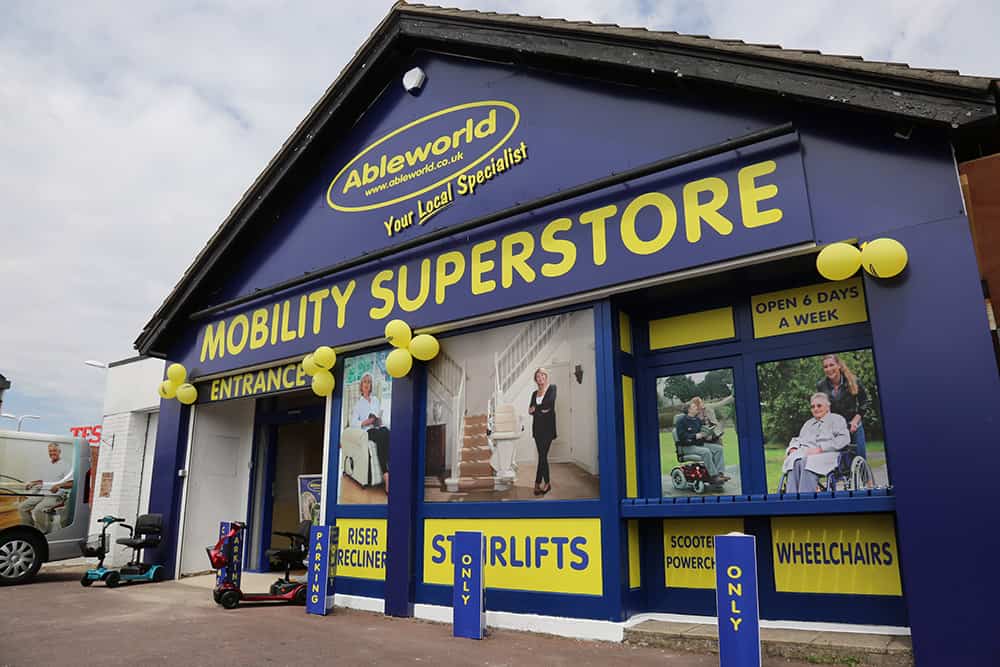
Despite the decision to keep showrooms open, however, Mike told THIIS that Ableworld has also had to adapt its retail operations.
“We have adapted our business in many areas to ensure we protect our employees and customers as best we can. We have furloughed virtually 50 per cent of our staff, closed a small number of stores on a Saturday, as well as now allowing our staff to ‘distance sell’,” he commented.
“This increases the likelihood of customer cancellations but it protects our staff and our customers as there is less contact.”
In addition, the company has introduced free deliveries to care homes and people wanting continence care products, alongside slashing its advertising costs by almost half and focusing on social media to promote ranges in higher demand – in particular, stairlifts and continence care.
“We’ve increased our stock holding of those products,” continued Mike.
“We have adapted our payments to suppliers ensuring payments are sent via BACS, as well as providing weekly payment runs to ensure our accounts are as kept up to date as possible. We have a small, dedicated team in accounts who are liaising with our suppliers to ensure accounts are reconciled and queries looked into, as well as being available to give honest answers about outstanding items on their account.
“Suppliers are an important partner and we will need each other once this is all over. We have also linked even closer with local authorities and OTs to support them where possible.”
In addition, the company has stopped going into customer homes for general servicing and has moved to only fitting stairlifts or repairs on essential items.
Stairlift providers rising to the challenge
Whilst the impact has been hard on bricks and mortar retailers, the fear of customers to let people into their homes during the pandemic has created its own challenges for those specialising in stairlifts and homelifts.
Relatively quickly into the crisis however, companies came up with a clever workaround: virtual consultations.
Anglia Stairlifts, Handicare and others embraced modern technology and advancements in video conferencing to carry out initial assessments for stairlifts without having to step foot into a customer’s home.
One of the first to pivot to video consultations, Handicare’s direct-selling team saw the need to find a way to continue installing stairlifts whilst at the same time, easing vulnerable customers concerns.
“We’ve sold both straight and curved stairlifts as a result, and had some great feedback from our customers who really need our help at what is already a very difficult time for them,” said Paul Stockdill, UK Sales & Marketing Director of Handicare.
“Our teams have adapted their process quickly and really got to grips with taking customers through the usual steps over the phone instead of face-to-face.”
One dealer specialising in stairlift Anglia Stairlifts, led by Managing Director Phil Rice, also introduced the new virtual service shortly after lockdown measures came into force.

Since offering virtual visits, the company has already carried out a number with customers which has enabled Anglia Stairlifts to continue operating despite the strict social distancing rules.
“It is vital for us to adapt quickly and effectively to this situation,” said Phil
“We provide a vital service for the country and this supports the NHS. Stairlifts/homelifts are an extremely important piece of equipment as they allow independence around the home and prevent falls/injuries which helps to keep hospital beds free, especially as they are currently needed.
“This current situation is scary for vulnerable people as COVID-19 is a very real threat to their safety. This “virtual-visit” option allows them to have confidence in that we are doing everything we can to keep them safe.”
Interestingly, Phil suggested that this new virtually solution could well be something that continues after the lockdown is over and the pandemic has passed.
“We will be continuing this service after this virus is a thing of the past,” he confirmed.
“We believe that this could be the future of the industry. More and more people are accessing this technology, which could make it easier for people to get quotes for stairlifts/homelifts. This could even be used by engineers in the near future to help diagnose breakdowns so they can make sure they have the right parts they need.”
Staying social during social distancing
For those retailers that have taken the decision to temporarily close their showrooms, many are not resting on their laurels. The majority have moved to provide products and technical advice over the phone, along with continuing to respond to emergency requests for repairs.
One consequence of closing showrooms, stopping gatherings and events and slowing down the introduction of new big-ticket items such as new powerchairs and wheelchairs has been a lack of new things for retailers to shout about on social media.
In addition, marketers have been amongst those that have been furloughed, leaving social media accounts to go quiet during a time when customers are online more than ever.
Seeing the need to continue reaching out and engaging with customers, Oxfordshire-retailer Recare came up with a novel way to keep people’s attention during the lockdown.
The mobility retailer created a new section on its website called ‘Interactive Puzzles’ where visitors can complete games related to the mobility industry.
From matching the seating product with the correct manufacturer to word searches on rollators and powerchairs, the games are designed to be a fun way for customers to continue interacting with the company despite its showroom being shut.
Annie Holland-Oakes, Marketing Manager of Recare, discussed the motivation behind the idea: “During this time, we can focus our efforts on keeping our brand awareness in the public eye, predominantly through our social media channels and website.
“To do this while being unable to visit clients to showcase our products and services encouraged us to think outside the box. We considered how else we could interact with our clients in an informative and educational way that was equally fun and light-hearted.”
According to Annie, the response has been positive to the puzzles, alongside providing the retailer something to talk about online that is entertaining, unique and, importantly, not coronavirus-dominated.
She also highlighted that it was not overly technically challenging to implement: “If anything, it was more time consuming than difficult. It required consistent trial and error to work out how to do it successfully and it took about a week to put in place.
“Currently, the puzzles are only available on desktop, although this is something we are actively working to change soon. It has taken off with a lot of success since the launch of it and it could be something we keep in place as an engaging client element on the Recare website in the future.”
The lockdown and slight break in normal proceedings has also given other companies an opportunity to turn their attentions to improving their online presence.
Refusing the let the current situation dampen their spirits or ambitions, Lifestyle and Mobility’s Business Development Manager Darren Macey described the retailer’s approach to tackling the coronavirus challenges.
“Wherever there is a negative, there’s often positives so for us at Lifestyle & Mobility, it was trying to find out what the positives were going to be during this lockdown!” he said.
“For those that know us on a personal level, our brains never stop and we are always looking for new opportunities and trying to be proactive. Due to our recent success, we haven’t been able to prioritise other areas of the business as much as I would have liked so this lockdown has allowed us to work on some of these areas, for example, our website.”
According to Darren, the company has used this time of unprecedented low demand to strengthen its web capabilities.
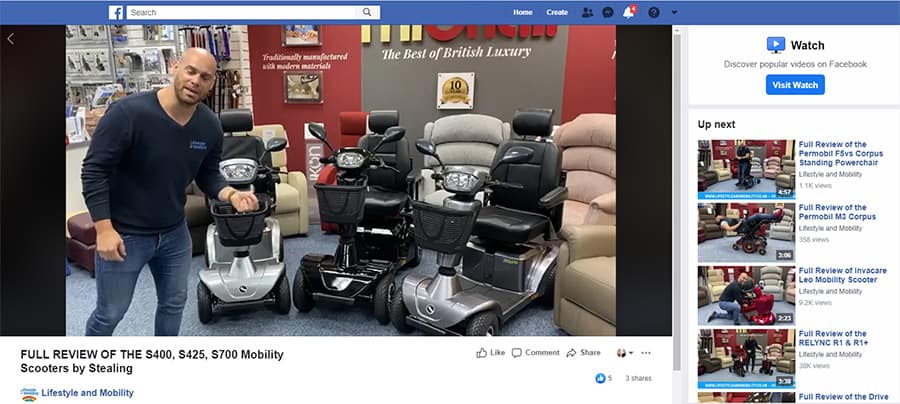
“We have massively been able to step up the content to our site such as a new tab for ‘Daily Living Aids’ we have also added a ‘Charity Funding’ tab. We want our website to be a one-stop-shop and library full of lots of useful information for our customers,” he continued.
“We have also been working hard on our YouTube and Facebook video channels for product reviews on all main unit items. I believe this is so important for the digital age we are in and vital information for our customers while in lockdown.
“This now gives all our customers a virtual experience and full product demonstration in our showroom without having to leave their sofa and front door.”
The emphasis on video, beyond being a powerful marketing tool, has also helped the company remain social with its customers during the lockdown.
“It’s also been great for a lot of our customers’ personal well-being,” added Darren.
“We have lots of nice personal messages come through on social media and our customers look forward to that virtual interaction on a daily basis.”
Creativity out of the crisis
Up and down the country, there are hundreds of mobility retailers experimenting and introducing new ways of working to help ensure their businesses can survive and their customers can still receive the help and solutions they need.
A common theme, however, is that the crisis has prompted a new wave of innovative ways of working, be it through introducing new product ranges, offering virtual assessments, running webinars and online product demonstrations and more.
It may be these innovative approaches to coping with the crisis that could redefine the mobility retail industry in the years to come – a small consolation for those in the sector working so hard during the pandemic.


